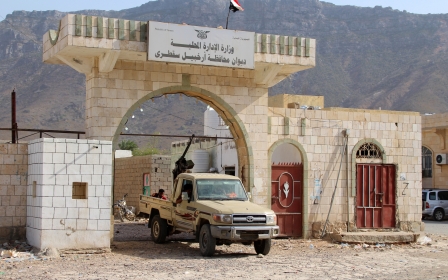Yemen's Southern separatists withdraw from peace talks

The Yemeni Southern Transitional Council (STC) on Wednesday said it has withdrawn from talks over a Saudi-sponsored power-sharing deal with the internationally backed government in Yemen.
The Yemeni separatist movement, which calls for a breakaway state in the country's south, said it had sent a letter to Saudi Arabia to confirm the "suspension of its participation in the ongoing consultations to implement the agreement".
The Riyadh agreement was struck last year and designed to mend the rift between allies in the war against Houthi rebels who have seized vast swathes of territory in northern Yemen.
At the time, the agreement was hailed as a stepping stone towards ending the country's civil war and aimed to end the "civil war within a civil war".
But the STC said it had withdrawn from talks after a ceasefire was broken and continued military escalations in Abyan province.
New MEE newsletter: Jerusalem Dispatch
Sign up to get the latest insights and analysis on Israel-Palestine, alongside Turkey Unpacked and other MEE newsletters
The separatist movement also complained about the failure to pay public servants and the collapse of services in southern Yemen - triggering calls for self-rule in April.
Despite its decision to withdraw from the talks, the STC's Vice President Hani Ben Brik said it was committed to the original agreement and said its move was aimed at pushing for a full commitment to the deal.
Continued breakdown in talks
Breakdown in talks with the STC has complicated a final peace deal between the Saudi-led coalition and the Iran-backed Houthis.
In July, the STC said it had come back to the Riyadh agreement after pressure from Saudi Arabia and the United Arab Emirates.
The plan called for the Yemeni prime minister to form a new government within 30 days and appoint a new governor and security director for the city of Aden.
Control for the south has also exposed divisions between Saudi Arabia, which backs the government, and the UAE, which has backed the STC.
The STC signed the power-sharing deal in Riyadh last November.
But the agreement failed to meet the deadline for key measures, including the formation of a new cabinet with equal representation for southerners and the reorganisation of the military.
Middle East Eye delivers independent and unrivalled coverage and analysis of the Middle East, North Africa and beyond. To learn more about republishing this content and the associated fees, please fill out this form. More about MEE can be found here.




